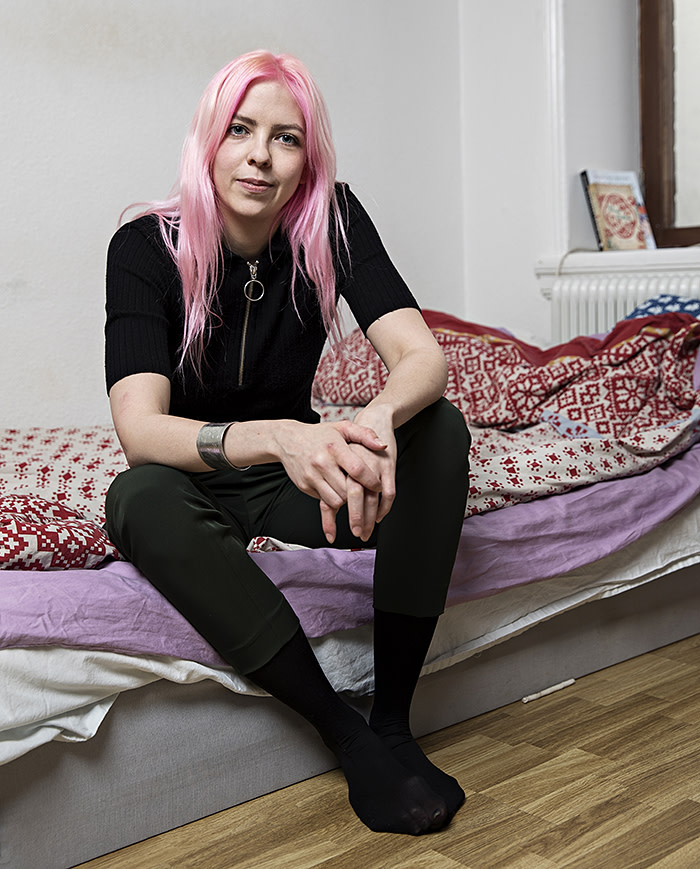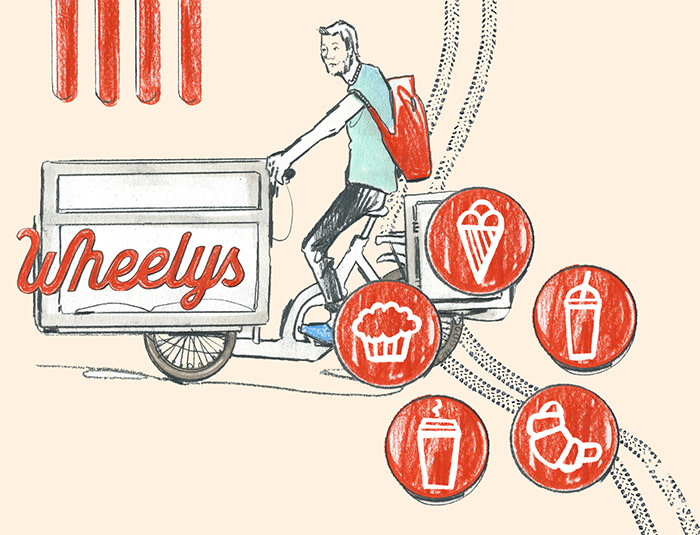Wheelys Café: freewheeling coffee traders
Simply sign up to the Retail & Consumer industry myFT Digest -- delivered directly to your inbox.
Maria de la Croix never planned to set up her own company. The thought came to the Swedish former arts student when she was casting around for a job.
She noticed how in Sweden some friends were doing well by selling coffee from a backpack. “I knew they earned quite a lot of money, they were doing it before school for two hours,” the 29-year-old says. “So the idea was, maybe it’s possible to sell coffee in a similar but more effective way — like from a bike.”
Thus, the idea for Wheelys — an organic coffee business on wheels — was born. De la Croix co-founded it with Per Cromwell and Tomas Mazetti, her former advertising agency employers.
In five years, the business has grown from one bicycle to more than 820 mobile cafés in 80 countries (a few more than Starbucks). It operates as a franchise, and is a reasonably affordable means of owning your own business. The bikes start at $4,000, a fraction of the cost of renting a bricks and mortar café.
Wheelys taps into several trends. The coffee is organic, bicycles are green and franchisees become part of the Wheelys “movement”. They have the freedom of being their own boss and join like-minded individuals held together by Wheelys concept of having a membership with attitude.

This freewheeling image appears to have struck a chord at a time of millennial backlash against big corporations. De la Croix denies any feelings of revenge against Starbucks. The coffee chain once turned her down for a job, apparently because of her hair colour — blue at the time, now pink.
Their policy has “since changed”, she says. Nevertheless, Wheelys relishes casting itself as the counterpoint to a Starbucks or a Nestlé, the Swiss food multinational that owns the Nescafé and Nespresso brands.
According to its sales pitch: “In the last 50 years, global brands have descended upon our cities like a swarm of locusts. Large corporations own every corner. We want to give the streets back to the locals. No boss, no desk. Just sunshine and the tastiest coffee the world has ever tasted.”
De la Croix was brought up in a small mining town in northern Sweden. Her father worked in the mine but her interests lay elsewhere and she left at the age of 18, for Bergen, Norway, where she studied art.
She then moved to Malmö in Sweden’s cosmopolitan south where she came across a maverick advertising agency, run by Cromwell and Mazetti.
They had organised a political protest — a 2013 air drop into Belarus of parachuting teddy bears carrying slogans promoting democracy. Other campaigns included a stunt to promote equal pay for women.
“They had an interesting take on PR and advertising, touching the art field,” says de la Croix. After “nagging”, the agency took her on but within a year, it closed and the three had to look for something else.
Having hit upon the idea of a mobile café, the trio’s advertising background came into play and they decided to brand the bike: “Wheelys”. Sales were encouraging but in order to build more bikes, they needed money.
In early 2014 they turned to Indiegogo, the crowdfunding platform. Wheelys offered the catch-line “A café in a bike. Deal with it” and the business proposition of, the “World’s first Global Bike Café for a better World”.
They raised $150,000 and had about 20 café bikes built. These all sold but they realised they had made the mistake of not charging enough for them. “We under-priced the bikes,” says de la Croix. “They were quite expensive and a lot of work to build. We were very much out of money.”
Investor appetite was distinctly limited. “We were pitching to investors in Sweden but no one saw it as anything else than a cute bike project selling coffee.”
The business got its big break when it was accepted by Y Combinator, the California-based start-up fund. “They were, like, ‘hell this can be bigger than Starbucks’,” says de la Croix. “They really saw the potential.”
That was in 2015 and since then Wheelys has raised money through a seed round, attracting investors that include Paul Buchheit, who helped develop Gmail, and Jared Friedman, co-founder of Scribd, the digital library.
The number of Wheelys café bikes has doubled each year and the business claims to sell more per square foot than any other food franchise.
It has developed ever-bigger bike models to cater to the growing ambitions of café owners, with add-ons like a crêperie and mobile coffee bean greenhouse, though it has gone back to basics with its most recent launch of a mini version.
The coffee used by franchisees, from Rwanda, Ethiopia and Indonesia, must be bought from the company to ensure consistency but owners can choose what food to sell, with a requirement that 60 per cent of what they sell should be organic.
Of the 820 Wheelys, about 60 per cent are in the US, followed by China, the Middle East and Europe.
The business model has changed since launch when Wheelys made most of its money from the sale of the bikes, which range between $4,000 and $15,000.
It has since worked on developing recurring sources of income, with the aim of reducing the cost of the bikes.

Most of its revenue now comes from selling coffee to franchisees, who also pay a monthly $99 subscription service entitling them to use the brand and access its app.
The app allows customers to locate a Wheelys and place orders before they arrive. It has a merchant side through which café owners order coffee supplies from the company, which makes 5 per cent on app transactions.
The franchisees make an average of $300-$400 a day, says Jamie Corley, chief executive, but can earn $1,200 on their best days. Corley adds that he averaged a little less than $1,000 a day at the start of his own Wheelys career in the Swedish capital Stockholm (see below). The trick, he says, was to sell packs of coffee to customers when they came for a cup.
His ambition is to get Wheelys owners earning $2,000 a day and most of his time now is spent on ways to achieve this — setting up training programmes and devising a system to solve the issue of obtaining street permits, which is often the biggest obstacle faced by the café owners.
Sometimes there are other problems. In Shanghai, for example, there was no difficulty in operating on the streets, save that Wheelys owners did not want to be associated with street vendors. Sales improved after they moved to shopping malls and business centres.
De la Croix says there is plenty of potential for the business. “We are working with cafés at the moment but there might be possibilities to do this with other kinds of products — basically anything you can sell from a mobile shop.”
Cromwell has started testing a Wheelys Moby Mart in Shanghai — a driverless solar-powered mobile supermarket that turns up when consumers call for it on their phones.
For now though, de la Croix says she is concentrating on developing the café network. “There are street corners everywhere and parking spots everywhere, so there can be a lot of Wheelys cafés. For me, the most important thing is to make it easy for people to run their own business.”
A perfect opportunity
Jamie Corley started out working as an engineer in the UK but was not enjoying himself: “I felt my creativity was boxed in,” he says, and so he went in for a bit of extended travelling.
In Australia, he met a Swedish woman who took him to Stockholm. Here he saw his road ahead. “I’d come from Melbourne where there’s a massive, massive coffee culture. I was like, right, this is the perfect opportunity, I’m going to start selling coffee from a bike because the Swedes love coffee.”
After trying out a few mobile cafés, he discovered Wheelys and thought their bikes were “great”. The hardest part of the job was his chosen city’s weather. In Stockholm, “it was like minus six, minus eight.
“I used to just stand there for eight hours shaking,” he recalls. “People would be buying coffee, I think, mainly, because they felt sorry for me.”
Though theoretically Wheelys’ owners can move their café around to hit the most crowded spots, and open and shut whenever they like, Corley says that in practice reliability is key to keeping your market.
“It’s very important to create this consistency, so you’re in the same place at the same time, so you build up that trust with your customers.”
He found the benefits of the job far outweighed any disadvantages. “To sell coffee on the bike is quite a joyous thing. I’ve seen probably thousands of customers and it’s kind of a fun concept, so you don’t really get negative people,” he says.
“A lot of people just want to come up and speak to you about the bike, the coffee. That’s fantastic. Listen to people’s stories and learn what they’ve been up to — it’s great.”
After getting a Wheelys bike two years ago, at the end of 2017 Corley was made the company’s chief executive. “Because I was in Stockholm, I think I had like a different communication with the HQ team. I was often in, seeing them and trying different tests with them and stuff like that,” he says. “And, eventually Maria called me into the office.”

Comments